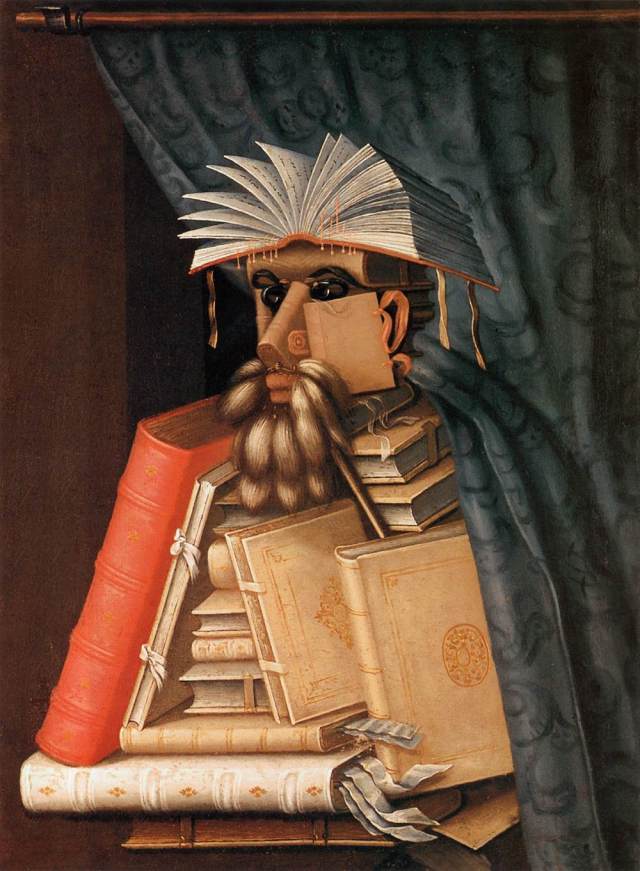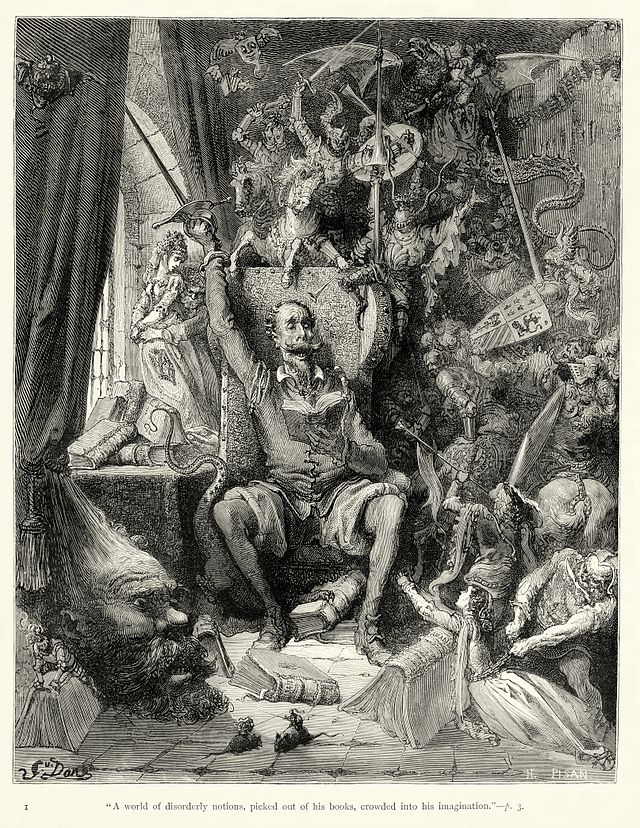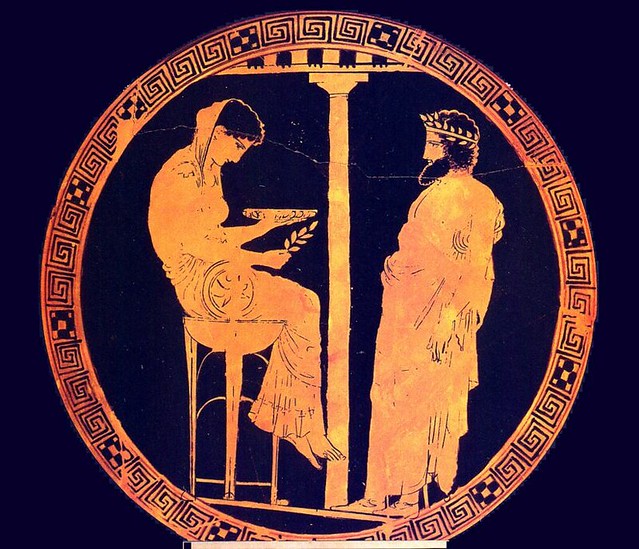“Idle Reader: Without my swearing to it, you can believe that I would like this book, the child of my understanding, to be the most beautiful, the most brilliant, and the most discreet that anyone could imagine. … I wanted only to offer it to you plain and bare, unadorned by a prologue or the endless catalogue of sonnets, epigrams, and laudatory poems that are usually placed at the beginning of books.
…
For how could I not be confused at what that old legislator, the public, will say when it sees that after all the years I have spent asleep in the silence of obscurity, I emerge now, carrying all my years on my back, with a tale as dry as esparto grass, devoid of invention, deficient in style, poor in ideas, and lacking all erudition and doctrine, without notes in the margins or annotations at the end of the book, when I see the other books, even if they are profane fictions, are so full of citations from Aristotle, Plato, and the entire horde of philosophers that readers are moved to admiration and consider the authors to be well-read, erudite, and eloquent men? … My book will lack all of this, for I have nothing to note in the margin or to annotate at the end, and I certainly don’t know which authors I have followed so that I can mention them at the beginning, as everyone else does, in alphabetical order, beginning with Aristotle and ending with Xenophon, and with Zoilus and Zeuxis, though one was a slanderer and the other a painter. My book will also lack sonnets at the beginning, especially sonnets whose authors are dukes, marquises, counts, bishops, ladies, or celebrated poets …
I am by nature too lazy and slothful to go looking for authors to say what I know how to say without them.”
Miguel de Cervantes, Don Quixote (from the Author’s Introduction)
I am currently feasting on Don Quixote in a gorgeous translation by Edith Grossman. Having read a large number of books on the adventures of chivalrous knights, Don Quixote decides to become a knight errant himself, and sets out into the world in order to live what he has read about. “Don Quixote reads the world in order to prove his books,” says of him Michel Foucault in The Order of Things, “His whole being is nothing but language, text, printed pages, stories that have already been written down.” Having spent days on pondering on the names for himself and for his horse, proving thus that his reality is first and foremost the language, he embarks on his first adventure. The most important thing about Don Quixote is that he never leaves the books he has so avidly engrossed himself in. Everything he sees on his travels is transformed in his mind into what he has read about. For example, the inn he sees appears to him “a castle complete with four towers and spires of gleaming silver,” and when a swineherd blows his horn to gather the pigs, the knight sees him as a dwarf signaling his arrival.
They pleasures of reading Don Quixote are endless, the layers of meaning plentiful, but the one I am focusing on today is the joy of reading, of burying oneself in an alternative universe conjured up between the pages of a great book. The comic genius of Cervantes pervades the pages, for example in the following tribute paid by Don Quixote to the lady of his heart, Dulcinea:
“… her condition must be that of princess, at the very least, for she is my queen and lady, and her beauty is supernatural, for in it one finds the reality of all the impossible and chimerical aspects of beauty which poets attribute to their ladies: her tresses are gold, her forehead Elysian fields, her eyebrows the arches of heaven, her eyes suns, her cheeks roses, her lips coral, her teeth pearls, her neck alabaster, her bosom marble, her hands ivory, her skin white as snow, and the parts that modesty hides from human eyes are such, or so I believe and understand, that the most discerning consideration can only praise them but not compare them.”
Don Quixote lives in the symbolic order, his feet barely touching the ground. His world is heady, insubstantial, made of paper. Still, as will be shown in the subsequent posts, he makes a tremendous difference to his surroundings. Although he is a self-proclaimed knight, and not born one, his nobility is real and pure, because it springs straight from the source and has not been contaminated by the embodied reality. He is a pure reflection of the knight archetype – he is a symbol, not a man any more. According to Cirlot’s Dictionary of Symbols, the knight “is the master, the logos, the spirit which prevails over the mount (that is, over matter).” The medieval ceremony of knighthood emphasized the head of the knight as its most important symbolic component:
“In the Middle Ages, a knight was created by a symbolic imitation of the ritual that used to make a man into a god: beheading him. Touching first one shoulder then the other with a sword implied that the sword had passed through the neck. Celtic tribes especially revered man-gods who were preserved in the form of severed heads, which were believed to give oracles. In Greece also, savior-gods like Orpheus spoke to their followers of the after-life through the mouths of their own mummified heads.”
Barbara G. Walker, “The Woman’s Encyclopedia of Myths and Secrets”
The beheading was an effective death of the ego preceding a rebirth to a higher, spiritual order. Just as Don Quixote owes his knighthood to no one but himself, so does Cervantes differentiate himself from erudite, snobbish writers of his era in the Introduction quoted at the beginning of this post. Don Quixote is a fiesta of pure, unbridled creativity, fantasy and imagination. It was dubbed the first modern novel because it created its own alternative literary reality. Fiction is not a mirror set to the world, but a whole new world in itself: an infinite world with endless possibilities. It is a domain of Mercurius: a trickster god building reality out of language. In a poem “The Joy of Writing,” written in a Quixotic tradition, Wislawa Szymborska captured the spirit of writing as a sort of lucid dreaming:
“Why does this written doe bound through these written woods?
For a drink of written water from a spring
whose surface will xerox her soft muzzle?…
Is there then a world
where I rule absolutely on fate?
A time I bind with chains of signs?
An existence become endless at my bidding?The joy of writing.
The power of preserving.
Revenge of a mortal hand.”

Support my blog
If you appreciate my writing, consider donating and make my day. Thank you in advance.
$1.00

















Marvellous, delightful post. It made me want to read it again… 🙂
LikeLiked by 1 person
The best compliment one can hear. Thank you so much.
LikeLiked by 1 person
The world always needs more knights. Gorgeously sumptuous!
LikeLiked by 1 person
Thank you – what a beautifully expressed sentiment.
LikeLike
Monika you have invoked a strong interest in me to want to read Don Quixote again. Marvellous post, thank you.
LikeLiked by 1 person
Thank you, Don. It has been incredibly entertaining, I must say.
LikeLike
Reblogged this on lampmagician and commented:
I am by nature too lazy and slothful to go looking for authors to say what I know how to say without them.”♥♥♥
LikeLike
Pingback: Reflections on Don Quixote (1): The Universe of Fiction | lampmagician
Reblogged this on Weaving Among The Stars.
LikeLike
It’s a while since I saw an Arcimboldo. Have never seen an Ocampo. Good piece.
LikeLiked by 1 person
Thank you – much appreciated. Ocampo is someone I am not very familiar with but somehow that image captured me immensely.
LikeLike
Ah, wonderful! I read a good chunk of Don Quixote on a 12 hour bus ride through small coastal and mountain towns, many grey drizzly hours punctuated with sudden moments of startling sunshine. I will forever remember Quixote as a fine traveling companion, yet he still remains as ephemeral in my mind as that misty rain without a place or time…
LikeLiked by 1 person
That is such a lovely memory. I have a similar habit of associating books with places where I was reading them. “Ephemeral as that misty rain without a place or time” – yes!
LikeLike
Ahhh. That is a book that has been on my list to read, but alas I have not read it yet. But your post makes me want to bump it up on my list. I have a Harvard Classic version on my shelf, so it’s just a matter of starting it. I like that your version has an introduction by Harold Bloom. I was fortunate enough to attend a guest lecture by Bloom in college and got to hang out and talk literature with him. I found him to be a nice guy, and he signed my copy of “The Book of J.” 😉
LikeLiked by 1 person
Hi Jeff – good for you, though I must admit I have not read anything by Bloom. I liked his introduction a lot. The book itself I’m finding delightful.
LikeLike
Oooo! You would love Mr. Bloom. Brilliant literary critic who is very learned in kabbalah, gnosticism, and Hermeticism.
http://en.wikipedia.org/wiki/Harold_Bloom
LikeLiked by 1 person
Nikole, thanks so much for introducing me to Octavio Ocampo. His work is precious, one of the most prominent artist in Mexico right now, if not the most, who befriended Diego Rivera’s daughter also, and is pivotal in the surrealist movement of art.
LikeLike
I have never read Don Quixote but I really want to now. I remember once discovering and falling in love with the word ‘quixotic’ without fully understanding what it meant. I’m intrigued now.
I’m also glad I read your comment regarding the symbology of a beheading. The villain in my new novel suffers this fate, and whilst part of me wondered if it might be in bad taste depicting such a fate in the light of what’s happening in the Middle East, this actually is the perfect metaphor for my story and I almost unconsciously knew this. Thank you 🙂
LikeLiked by 1 person
Thank you. I was glad to read your comment. Don Quixote is a beloved character of Buddhist thinkers, actually. I quite enjoyed this talk, for example: http://www.freebuddhistaudio.com/audio/details?num=LOC1767
I think Don Quixote can actually be looked at as a spiritual teacher. I’m not surprised you find him intriguing.
Regarding beheading, I hope terrorists will not rob us of our universal symbols. Well, the Nazis managed that.
Best wishes,
Monika
LikeLike